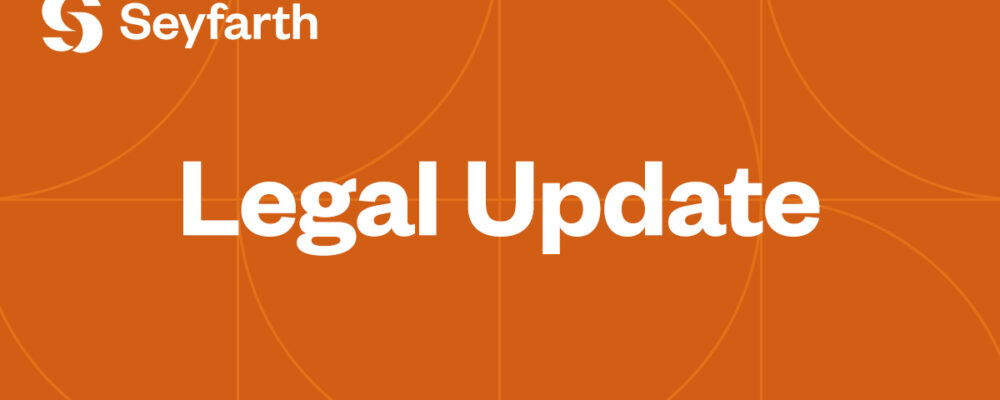Traditionally, Republican administrations have favored deregulation and a more lenient approach to antitrust enforcement that is grounded in economics over policy preferences. This environment often leads to an increase in merger and acquisition activity, as companies feel more confident in pursuing significant deals without the fear of stringent regulatory intervention. While a second Trump administration should bring with it a return to an economics-based antitrust enforcement approach, wholesale change in antitrust enforcement policy from that of the outgoing Biden administration is unlikely.
New leadership at both the Antitrust Division of the U.S. Department of Justice (DOJ) and the Federal Trade Commission (FTC) are likely to reaffirm the commitment of those agencies to the “consumer welfare” standard of the Chicago School that has long informed U.S. antitrust analysis. Under the “consumer welfare” standard, antitrust enforcement focuses on price and output—whether a transaction will raise prices or reduce the quality of goods or services for consumers, relying heavily on economic evidence and empirical analysis. This approach tends to promote M&A activity rather than hinder it. But populist skepticism about industry consolidation, particularly in the Big Tech industry, is bipartisan and likely to inform antitrust enforcement decisions in the second Trump administration.
What May Change
After his election in 2020, President Biden brought in “neo-Brandeisians”—skeptics who doubted the consumer welfare standard and sought a return to older U.S. competition policy informed by a general concern about the abuse of economic power—to run the antitrust agencies, appointing Jonathan Kanter to head the DOJ Antitrust Division and Lina Khan to chair the FTC. Neo-Brandeisians generally believe that the Chicago School overlooks negative effects that the concentration of economic power has on market structures, unemployment, income inequality, and wage growth, among other things. Under their leadership, the DOJ and FTC withdrew the 2020 Vertical Merger Guidelines issued only one year earlier; withdrew antitrust policy statements concerning healthcare that identified safe harbors for information exchanges; and issued revised 2023 Merger Guidelines making policy arguments based on older U.S. Supreme Court antitrust decisions and rejecting portions of economic guidance contained in the 2010 Horizontal Merger Guidelines.
It is unlikely that either Assistant Attorney General Kanter or Commissioner Khan will continue in their leadership roles once President Trump is sworn into office in January 2025. Although her term actually expired in September 2024, Commissioner Khan may continue to hold her position as an FTC commissioner until her successor is named by President Trump and confirmed by the Senate, but she will be replaced as FTC chair by one of the Republican commissioners shortly after President Trump takes office. New political leadership is likely to end to some of the more aggressive positions espoused by the agencies during their tenures. The DOJ, for example, has recently taken the position in civil enforcement lawsuits and in statements of interest that the mere exchange of information among competitors, without more, may constitute a violation of the antitrust laws. It seems unlikely the second Trump Administration will continue to press this policy position.
Change is likely to come more slowly at the FTC, where Democrat appointees will continue to enjoy a 3-2 majority until Commissioner Khan’s successor is confirmed. Even if Commissioner Khan resigns her post at the outset of the incoming Trump administration, the commission will have a 2-2 split of Democrat and Republican appointees, meaning that there is not likely to be any consensus at the agency about reversing recent FTC rulemaking for several months. This means the Fifth Circuit will likely have the opportunity to decide whether the FTC exceeded its rulemaking authority when it enacted its Non-Compete Ban—which was enjoined by a Texas federal judge in August 2024 before the rule went into effect—before a Republican majority at the FTC even had an opportunity to rescind that rule. And even if Republicans did control a majority of the FTC, the Republican commissioners may not be inclined to rescind the rule, preferring instead to wait to see how the Fifth Circuit and perhaps even the U.S. Supreme Court weigh in on the limits of future FTC rulemaking.
Most uncertain is the future of the 2023 Merger Guidelines, which represented a marked departure from longstanding U.S. merger policy informed by the Chicago School. Consistent with Neo-Brandeisian views, the 2023 Merger Guidelines were designed to strengthen enforcement against economic concentration by, among other things, reverting to presumptions about the likelihood that “horizontal” mergers (those between direct competitors) will substantially lessen competition not relied on since the 1960s, and expressing a new-found skepticism toward mergers involving “vertical” integration (between, for example, a distributor and supplier). The incoming leadership at the agencies could choose to withdraw that guidance in the same manner as the outgoing leadership withdrew the 2020 Vertical Merger Guidelines. If they choose to do that, they could reinstate those guidelines together with the 2010 Horizontal Merger Guidelines. But that approach may only serve to undermine the legitimacy of U.S. competition policy—after all, it is the courts, not the DOJ and FTC, that interpret federal antitrust laws, and despite the change in administration, Congress has made no change to those laws. Moreover, the 2023 Merger Guidelines are just that—guidelines, and courts and agencies are free to take them into account for whatever they are worth when making decisions about specific matters. A compromise position may be for the DOJ and FTC to simply make the 2010 Horizontal Merger Guidelines and 2020 Vertical Merger Guidelines available to the public and invite courts, practitioners, and economists to use all of the guidance provided by the agencies as they see fit.
What May Not Change
Those looking for a wholesale change in antitrust enforcement policy are likely to be disappointed. While political leadership is critical, both agencies have professional long-term staff who historically have been the source of thoughtful enforcement decisions and policymaking based on concrete economic data. The agencies have broad authority to collect data to identify the market effects of particular actions by actors in particular markets, and retrospective studies done in the healthcare and technology industries, for example, have provided significant support for agency action.
The agencies are likely to continue aggressive antitrust enforcement in Big Tech. Enforcement actions brought by the agencies against Big Tech companies for monopolization and attempted monopolization of various markets were the result of painstaking efforts by professional staff at the agencies over several years to gather and analyze data concerning the technology industry. President Trump’s prior administration showed no hesitation to intervene in high-profile technology mergers that raise antitrust concerns. Moreover, during President Trump’s first term, the FTC in February 2020 sought information from five large technology companies concerning acquisitions for which premerger notification filings were not required under the Hart-Scott-Rodino (HSR) Act to determine whether these companies were engaged in anticompetitive acquisitions of nascent or potential competitors.
If past is prologue, other industries are likely to remain under scrutiny. President Trump’s first administration was particularly vigilant in sectors deemed critical to national security and economic stability. In addition to technology, this includes the telecommunications and defense industries, where transactions involving foreign entities or significant market consolidation are likely to be reviewed closely.
Similarly, parties to large merger and acquisition transactions should anticipate both the DOJ and the FTC will continue aggressive enforcement activity to block potentially anticompetitive transactions. Recent enforcement actions to block consolidation in the airline industry, for example, have relied on traditional analysis of the competitive effects of the proposed transaction using the consumer welfare standard, and appear to be the type of cases that would be brought regardless of who occupies the White House. Moreover, the FTC’s adoption last month by a unanimous vote of a revised HSR rule that will require parties to proposed transactions to provide substantially more documents and information with premerger notification filings under the HSR Act suggests there is bipartisan concern about the potential anticompetitive effects of large transactions.
“With approximately 900 lawyers across 17 offices, Seyfarth Shaw LLP provides advisory, litigation, and transactional legal services to clients worldwide.”
Please visit the firm link to site





